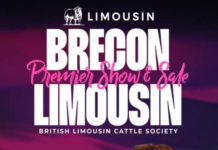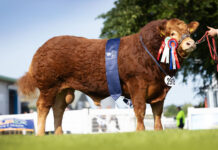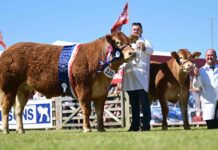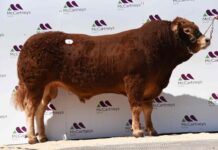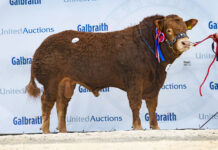Health Initiative
LIMOUSIN NUMBERS IN HERD HEALTH SCHEMESCONTINUES TO INCREASE
29% of all pedigree calves registered in 2009 in CHeCS health schemes
29% of all calves registered with the British Limousin Cattle Society in 2009 were from pedigree herds in Cattle Health Certification Standards, or CHeCS, licenced herd health schemes. In total this amounts to 5328 pedigree calves registered from 166 herds (up by six herds on the year).
The figures released for 2009 represent the fifth year of the British Limousin Cattle Society’s commitment to financially support members joining a CHeCS licenced herd health scheme. The British Limousin Herd Health Initiative offers financial support to breeders who are making a long-term investment into herd health assurance through being a member of a CHeCS approved scheme. Herds within a CHeCS scheme are able to make a claim each year based on the numbers of pedigree calves they have registered in the preceding twelve-month period. The cash-back is based on £4+VAT per calf up from £2 in the preceding period). This cash-back incentive will continue during 2010 subject to an annual renewal.
To receive the financial support, herds need to adhere to the terms of a CHeCS licenced scheme and have an approved animal health scheme in place through either BioBest Herdcare, SAC Premium Cattle Health Scheme, HI Health, Advance Cattle Health Scheme, NML Herdwise or the AFBI Cattle Health Scheme. This must include a whole herd test for Johne’s disease. As a result of the increased uptake, The British Limousin Cattle Society has paid out over £10,000 to participating herds for 2009, and over £40,000 in all since the initiative’s introduction in 2005.
An extension of its Herd Health Initiative saw the British Limousin Cattle Society introduce breeder Herd Health Declarations into Official Sale catalogues in 2007. The Declarations, which provide up to date herd health information regarding each vendor on TB status, BVD, IBR, Lepto and Johnes, have been warmly welcomed by both vendors and purchasers as an added marketing and selection tool at the point of sale. At the Society’s forthcoming Carlisle May Sale of 388 head, 94% of vendors have Herd Health declarations included in the sale catalogue.
Commenting, British Limousin Cattle Society Development Manager Richard Saunders said: “The Herd Health initiative was introduced initially for a period of three years. Its uptake in that time has been very positive and as such the initiative has been extended and is now moving into its sixth year. In 2010, herd health is a focus at every level of the industry and impacts directly on sustained productivity and profitability. It is clear at the point of sale that demonstrable herd health information is one of the most important requirements of would be customers.”
Limousin Herd Health Initiative Continues to Grow
28% of all Society registered calves now from herds in health schemes
Press Release : March 2008
Breeders’ participation in The British Limousin Cattle Society’s Herd Health Initiative has continued to grow with 150 herds, representing 5,161 pedigree Limousin calves, having registered for the financially incentivised initiative. This represents an increase on the year of 22 herds and a further 588 calves.
At the end of the final year of what is initially a four year commitment by the BLCS, this represents a further growth in uptake of 13%. This means that of the 18,240 pedigree calves registered with the Society last year, a very encouraging 28% are from herds operating within industry-licenced health schemes.
The British Limousin Herd Health Initiative offers financial support to breeders who are making a long term investment into herd health assurance through being a member of a Cattle Health Certification Standards (CHeCS) approved scheme. Herds within a CHeCS scheme are able to make a claim each year based on the numbers of pedigree calves they have registered in the preceding twelve month period.
To receive the financial support, herds need to adhere to the terms of a CHeCS licenced scheme and have an approved animal health scheme in place through either Biobest Herdcare, SAC Premium Cattle Health Scheme, HI Health, Advance Cattle Health Scheme, NML Herdwise or the AFBI Cattle Health Scheme. This must include a whole herd test for Johne’s disease. As a result of the increased uptake, The British Limousin Cattle Society will pay out over £10,000 to participating herds for 2008.
Commenting, British Limousin Cattle Society Development Manager Richard Saunders said: “These figures are very positive and underline the Society and its members’ commitment to herd health. I’m pleased to report that the Council of Managent of the British Limousin Cattle Society has pledged its support for the continuance of the cash-back incentive for 2009. An extension of herd health has seen the successful introduction of standardised Herd Health Sale Declarations at all Collective Society Sales from 2008 which has been warmly welcomed by bull purchasers.”
2605 Calves Entered Through The Limousin Herd Health Initiative
Press Release : March 2005
Eighty two herds representing 2605 calves claimed financial support through the first year of the British Limousin Cattle Society’s Herd Health Initiative. As a result, the Society paid out over £5000 in total to participating herds in 2005.
Financial support to the level of £100,000 has been made available, initially over a four year period, as an encouragement to Limousin Society members who are making an investment in long-term herd health assurance. Monies have been paid back to participating members through a ‘cash-back’ scheme based on the number of individual herd registrations per annum lodged with the Society.
To be eligible, pedigree herds have to be demonstrably within, and adhering to the terms of, a Cattle Health Certification Standards, or CHeCS, approved animal health scheme to include a whole herd Johne’s test. CHeCS is a self-regulatory body for Cattle Health Schemes in the UK and licence holders include Premium Cattle Health Scheme, HI Health and Herdcare. Herds are able to claim in each year of the initiative that they participate in and new herds can join at any time and claim from that year onwards in accordance with the outlined criteria.
The significant financial commitment to herd health is a principal part in the Society’s ongoing technical drive to provide breeders and customers with cattle that combine the highest visual and genetic quality with an assured high health status. Commenting on the first year of the initiative, Aled Edwards, Chairman of the British Limousin Cattle Society said, “From a standing start, the first year’s participation is extremely encouraging. This is step one in what is very much a long-term initiative and one that has been widely welcomed by the agricultural industry as an important and leading project for the promotion of responsible Herd Health management”.
“Members have been quick to recognise the industry value and marketing advantage this initiative will bring to the breed, breeders and customers. It is a responsible aim of the Society and its breeders to provide its customers with cattle of a known and assured high health status,” he said
The Limousin Herd Health Initiative is indicative of the Society’s aim to provide high level, added value projects and services, with a commitment to invest heavily in initiatives that reward good practice in the management and promotion of Limousin herds and the Limousin breed.
LIMOUSIN SOCIETY INVESTS £100,000 IN HERD HEALTH INITIATIVE
Press Release : February 2005
In a major policy announcement, The British Limousin Cattle Society has outlined its plans to invest £100,000 in the introduction of a progressive breed Herd Health Assurance initiative.
The initiative, which will be open to all 2,500 members of the BLCS, will play a central part in the Society’s ongoing technical drive to provide cattle that combine the highest visual and genetic quality with an assured high health status.
Announcing the plans, BLCS Chairman, Aled Edwards said: “This is an exciting step forward for the Society. The initiative is a responsible, long term commitment to herd health that is introduced with welcome scientific backing. In today’s industry the emphasis is very much on quality, efficiency and costs of production. We will continue to meet the demands of the market place and this is a logical further step forward to positively provide our customer base with health assured cattle, both male and female.”
Financial support will be made available, initially over a four year period, to both those members who are already making an investment in herd health assurance and as a means of positive encouragement to those considering their herds’ involvement. Participating members will receive monies through the practical option of a ‘cash-back’ scheme based on the number of individual herd registrations per annum lodged with the Society. To be eligible, herds will have to be demonstrably within, and adhering to the terms of, a Cattle Health Certification Standards, or CHeCS, approved animal health scheme. CHeCS is a self-regulatory body for Cattle Health Schemes in the UK and licence holders include Premium Cattle Health Scheme, HI Health and Herdcare. Commenting, CHeCS Executive Director Tim Brigstocke warmly welcomed the BLCS plans, he said: “This is an excellent long term investment in herd health by a major breed society that will be welcomed by Government and the whole of the food chain.”
The BLCS initiative will be administered by the Society with monies paid back to the value of £25,000 retrospectively at the end of each year.
BLCS Chief Executive, Iain Kerr, said that the initiative was ground breaking for the Society and was again ‘taking the lead’ to meet the industry challenges ahead. “With the introduction of the Single Farm Payment, the BLCS believes that assured high health status is an essential criteria to sell breeding and prime stock into premium markets and to be in a position to fully exploit all new opportunities,” he said.
In August of last year, the Society held an Elite Sale within its World Congress that carried high health status entry conditions. This principle was well received by vendors and purchasers alike and its success contributed to the Society’s determination to pursue long term positive herd health policies.
Detailed plans of the initiative will be rolled out to members in February and will be a point of discussion at the forthcoming Spring Bull Sales.


